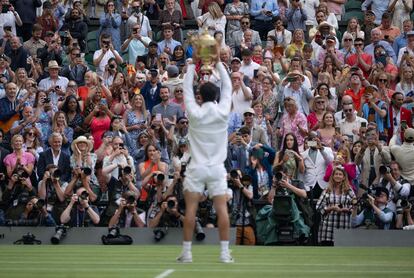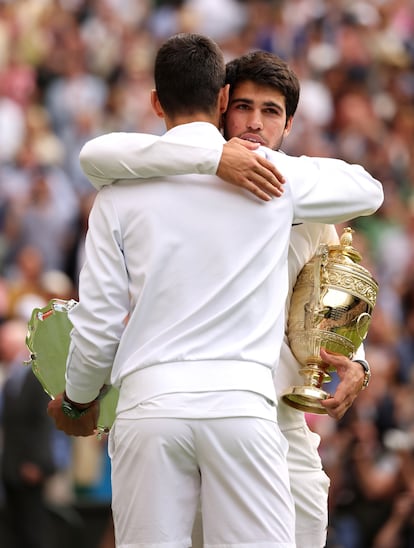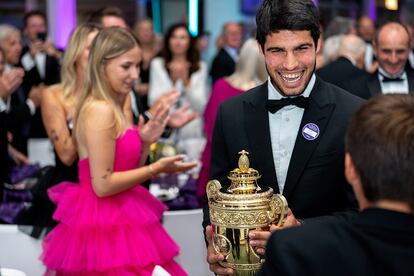Carlos Alcaraz: ‘I know how good a player I am. I don’t think that’s arrogance, but self-confidence’
The world number one talks to EL PAÍS about his historic triumph at Wimbledon, fame, and his meteoric rise


“What’s your bet I’ll get it in?” Jaime, the youngest Alcaraz Garfia, throws again and again at the basket next to the entrance porch of the house where the family has been staying for the last month. The boy asks while his older brother, Carlos, the second of the four sons, is receiving reporters one by one and with a smile from ear to ear. These special envoys have accompanied him for the last two weeks at Wimbledon, where the Spaniard made history again. The day before, the tennis player brought down an empire, that of Novak Djokovic, and his face shows that the pressure he was under has lifted. The champion laughs easily, he is happy, but at the same time he looks sleepy, and his movements reflect a slight exhaustion. Little wonder.
There have been 12 grueling matches in the four weeks he has been in London, the scene of a historic turnaround in his sport. The Serb had not lost at Wimbledon since 2013, but then “Carlitos,” the number one seed whose star is rising like crazy, finally arrived, and everything changed. Tennis is witnessing the definitive birth of a new era with him at the forefront, rising and projecting himself, so much and in such a short time that more than a few specialists have discerned a design never seen before: Federer, Nadal and Djokovic, all rolled into one. Nole can testify — “I had seen a player like him,” explained the Serb after losing in the final — while the young king of the circuit, with two majors already under his belt and the world before him, suggests the formula. It works for him, although he omits the obvious, the intangible: “Work, work, and more work.” His legs are perfectly defined, his high-fives are strong, and his Murcian accent gets thicker when he interacts with his people.
Question: Leo Messi slept with the trophy when his team won the World Cup in Qatar. Have you been known to do the same?
Answer: It was there [he says pointing to an adjoining room], but now I don’t know where it is. The truth is that I haven’t slept with the trophy, but I don’t rule out doing it one of these days... [laughs].
Q. How do you sleep when you are Wimbledon champion?
A. I slept very, very well. Yesterday I went to bed very calm compared to the night before the final... It was an atypical night of nerves, and compared to last night it was like, phew! Much calmer now... I am much more relaxed.
Q. And what does a number one dream of after achieving what you have achieved?
A. Honestly, I don’t remember what I dreamt last night, but I usually do. I am one of those people who fall into a deep sleep and usually dream.
Q. Has it sunk in yet that you won Wimbledon and that you have come this far, or are you starting to normalize all this?
A. No, no, I’m still processing it... I still don’t believe it, to tell you the truth.
At that moment, the ATP’s communications manager brings the cup that certifies Alcaraz’s achievement at the All England Tennis Club. His agent, Albert Molina, the man who follows each and every one of his steps around the world, also drops by the room sporadically. “Carlitos, more roses have arrived...,” he tells him, while his father, also Carlos, looks enthusiastically at the gigantic bouquet of white flowers and calculates the weight of the vase. Near the kitchen, the oldest brother, Álvaro, explains that Djokovic’s movements and tennis are overwhelming: “He pushes you backwards all the time, he always puts his shots where he wants, he opens you up, he cuts you short... It’s brutal.” Alcaraz, meanwhile, takes the trophy in his arms and embraces it as if he were afraid that someone might snatch it away from him. “Look, here it is, here it is, here it is!” he says between guffaws.
Q. We were talking about you and the extraordinary.
A. No, the truth is that I don’t believe it, and I’m still telling my family: I’m Wimbledon champion! And those are big words. It was a dream and it is crazy to have been able to make it come true. I always dreamed of winning this tournament because it is different and makes you feel different. You see the green, how perfect the grass is and how beautiful the club is, and it wins you over quickly.

Q. You said three years ago that you didn’t feel like the chosen one; later, when you won the U.S. Open, you denied it again. However, I don’t believe you. Please convince me.
A. I’ll be honest, I don’t consider myself the chosen one. That is achieved simply through hard work, there are no secrets. In this world there are no secrets, but everything is achieved day by day through perseverance and effort. Details make the difference. Many great athletes or legends in all fields say it: the details are what make the difference, and in the end pursuing your dream, being clear that you are going to make it come true it and trusting that you are going to make it come true it is what makes the difference and what allows you to reach the goals you set for yourself. I am not a chosen one, but I have simply pursued my dream and believed in myself at all times. Obviously, behind all of this there is a lot, a lot of work.
Q. So you consider yourself a worker beyond the talent you possess?
A. Yes, I consider myself a worker, although that has changed over the years. I have to be honest with you, and at the beginning I wasn’t so honest.... [laughs]. In the end, when you’re little it’s always hard to do some things you don’t like, but I’ve been learning that the days that are hard, the days you don’t feel like it, the days you don’t feel like training or you’re lacking motivation, count twice as much. So you have to get out of bed and make yourself do it. I have learned how to do it and I think that is what is making the difference and what has led me to be where I am today. You don’t get anything for free.
Q. In a very short time you have gone from being a promising, normal, everyday boy to one of the most recognizable faces in a global sport like tennis. How do you keep it all from getting too much for you?
A. I believe that the explanation lies in the fact that, in the end, we are very clear about our objective. We are gradually making our dreams come true: to be number one, to be a Grand Slam champion, to win Wimbledon... and I want to win Roland Garros and Australia as well, but the very long-term goal is to be considered one of the best in history, as great legends like Djokovic, Rafa [Nadal], and Federer have achieved. I have always said it, it may be that this goal is too big, too ambitious or that they think I am arrogant, but in the end in this life you have to think and dream big, and you have to go for it. All this is not too big for me because I know and I am very clear about what I want to achieve in the future, so I must continue on this path.
Q. In an exceptional case like yours, are you aware of how good you are? Are you fully aware of your potential and how far you can go?
A. We have to look at reality and be honest. I do know how good a player I am, and I don’t think that’s arrogance, but simply self-confidence. I know how difficult it is for opponents to beat me and to play at a very high level for so long against me in order to beat me, and I think that is a virtue I have. It’s about self-confidence and, yes, I know I’m a good player... [laughs].
Q. After winning in New York in September last year, you said that you had not done things quite right, that you had lost your way a little bit. Do you think that the same thing could happen after this win or has it been corrected in that sense?
A. I have more than learned my lesson. It’s like the match against Djokovic at Roland Garros and yesterday’s match; I learn from my mistakes. Every time something happens to me that should not have happened, I learn so that I can be prepared for the next time so that it does not happen again. I don’t think [what happened at] the U.S. Open will happen to me again because that lesson has already been learned in my head.
Q. Now, after such a great high as yesterday and all the adrenaline of the last few weeks, what do you feel like doing the most?
A. Honestly, to go back home and be with my family, to be with them again and eat with them. I miss it. I miss those routines of being in my village and with my friends, being at home; not doing much, you know? Just enjoy having that feeling of being at ease with them and having a few laughs.

Q. Your popularity has skyrocketed; in fact, you have the fastest growing fanbase of all the players on the ATP Tour. Everybody wants a piece of you. Don’t you miss normality? How do you cope with the fame?
A. It has its good and not so good things. In some respects I miss being able to do certain things. I miss doing some of the things that normal 20-year-olds do, but that’s short-lived. Everyone wants to live their dream and I am fortunate to be able to live it and achieve it, to be surrounded by great legends of Spanish sport and sport in general, from all fields. To be able to chat with them... It was something I couldn’t imagine, somehow. When they tell you they admire you, you don’t believe it, so it has its good things and its not so good things.
Q. Brad Pitt, Shakira and all kinds of celebrities have been watching you play at Wimbledon. When you are there and you see them, what do you think?
A. It’s awesome, really. You see great artists, actors, and athletes coming to watch your games and supporting you, writing to you, telling you that they are proud of you... And it’s really crazy.
Q. Toni Nadal writes that, beyond Djokovic (who is 36 years old), he does not see anyone who is capable of really standing up to you right now. What do you think?
A. It is very difficult to play at a very high level throughout the year and all the tournaments, so I think there are many players who are there. I have the head-to-head against Felix [Auger-Aliassime] and against some other players, and I have difficulties because in the end each opponent is different and some can hurt me more than others. Every time I play [Jannik] Sinner, for example, he raises his level to one hundred percent, and I do the same; he’s beaten me and I’ve beaten him in big battles... Holger [Rune] is also there, so there are a lot of guys who can beat me and match me. That’s tennis.

Q. What about Djokovic? Do you think that at his age he will be able to keep up and pick up the gauntlet that you have thrown down?
A. I know that now everyone will want to beat me and that’s nice, but at the same time I’m keeping my eye on Novak. I would love to play against him many more times [so far it has been three, with a 2-1 advantage to the Spaniard], because it is a tremendous challenge and I still consider him to be the best. I have always admired him, I have watched countless videos of him to learn. It’s not enough to win one game to change that, so I have to do it more times.
Before the farewell, Alcaraz thoroughly checks the trophy. “No, my name is not on it. Only the winners up to 2008,” he says by mistake, since his last name is already in the database. He is the first Wimbledon champion since 2002 not named Federer, Nadal, Djokovic, or Murray, and has earned $3.6 million for this latest triumph, bringing his on-court earnings to $20.3 million. Having entered a new reality, the tennis player is not losing momentum and this week he travels to Nice to play for Spain in the rebooted Hopman Cup — a mixed competition that has returned to the calendar. Before returning to El Palmar for a couple of days to savor the local peace and quiet that he misses so much and hang out with friends in the town square.
“We’re going home, but this goes on,” his father says. “Then we’ll go to North America [Montreal and Cincinnati] and then he’ll have to go to New York to give it his all,” he continues while his son, the seductive champion, sees what is to come with commitment and optimism: “Yes, at the end of August I’m playing the U.S. Open again. Hopefully everything will continue as it has been, and we will have chats like this more often.”
Sign up for our weekly newsletter to get more English-language news coverage from EL PAÍS USA Edition
Tu suscripción se está usando en otro dispositivo
¿Quieres añadir otro usuario a tu suscripción?
Si continúas leyendo en este dispositivo, no se podrá leer en el otro.
FlechaTu suscripción se está usando en otro dispositivo y solo puedes acceder a EL PAÍS desde un dispositivo a la vez.
Si quieres compartir tu cuenta, cambia tu suscripción a la modalidad Premium, así podrás añadir otro usuario. Cada uno accederá con su propia cuenta de email, lo que os permitirá personalizar vuestra experiencia en EL PAÍS.
¿Tienes una suscripción de empresa? Accede aquí para contratar más cuentas.
En el caso de no saber quién está usando tu cuenta, te recomendamos cambiar tu contraseña aquí.
Si decides continuar compartiendo tu cuenta, este mensaje se mostrará en tu dispositivo y en el de la otra persona que está usando tu cuenta de forma indefinida, afectando a tu experiencia de lectura. Puedes consultar aquí los términos y condiciones de la suscripción digital.








































